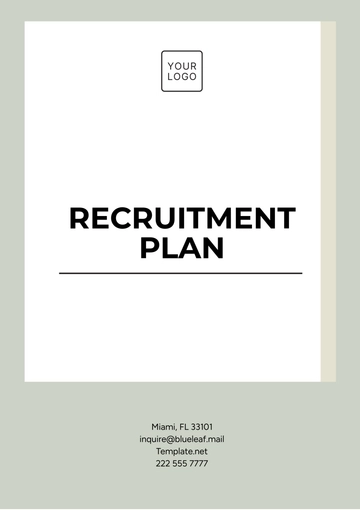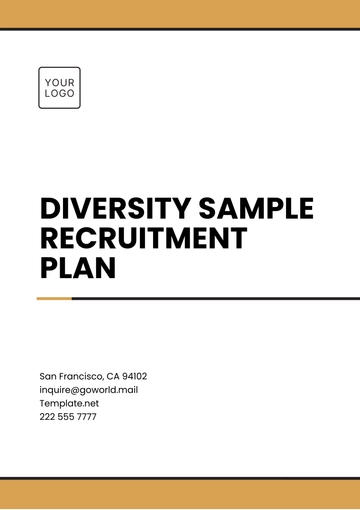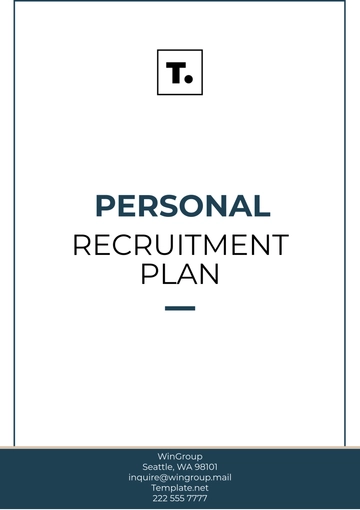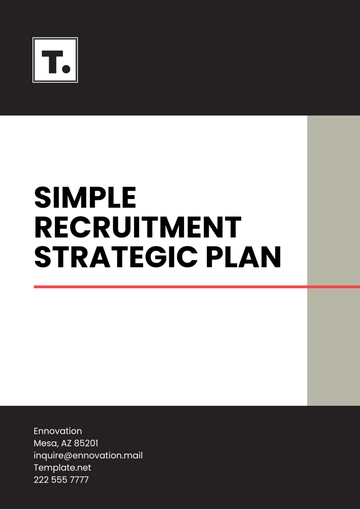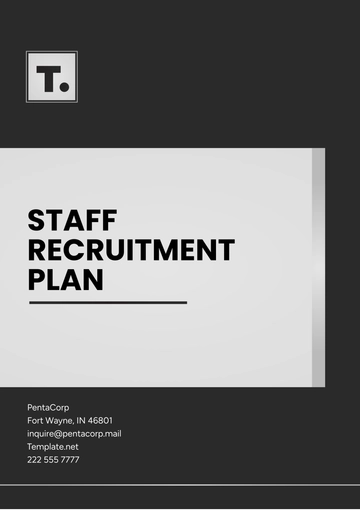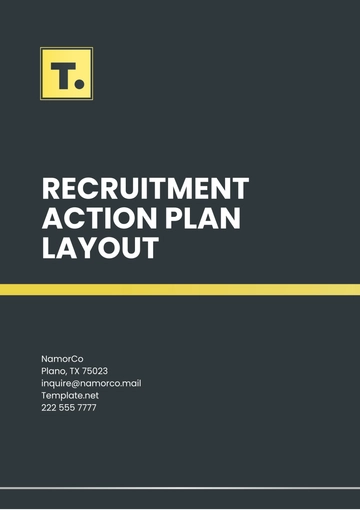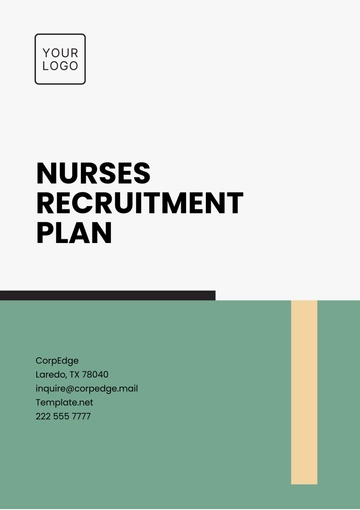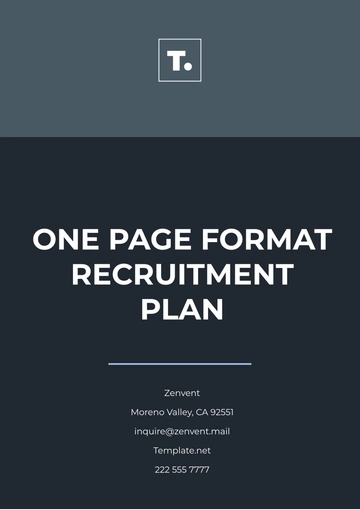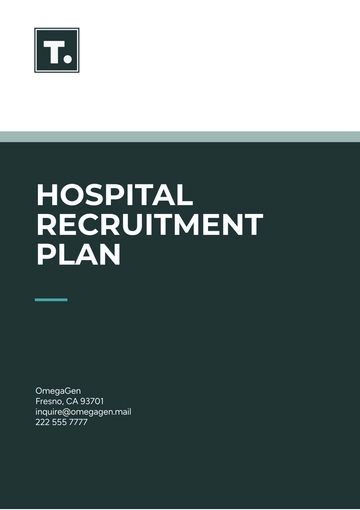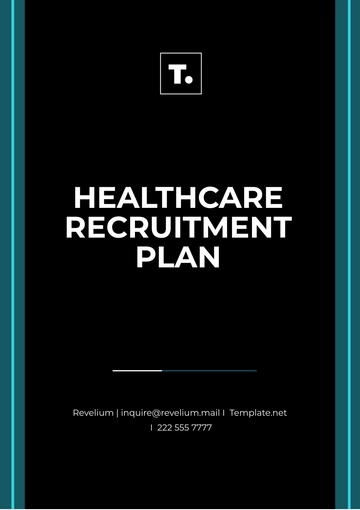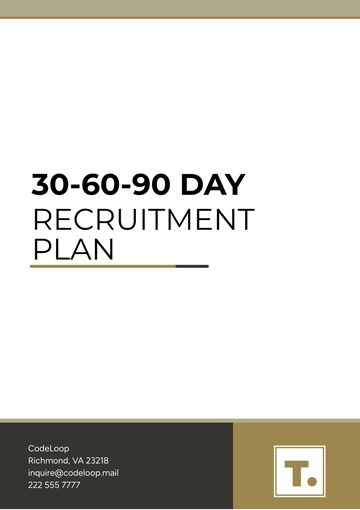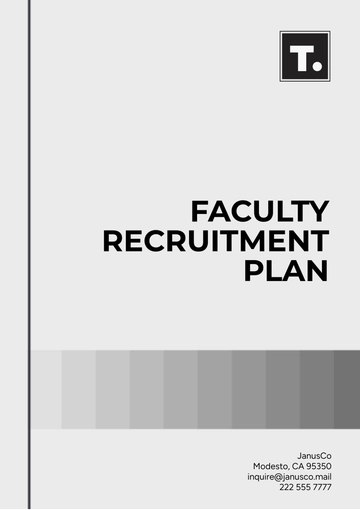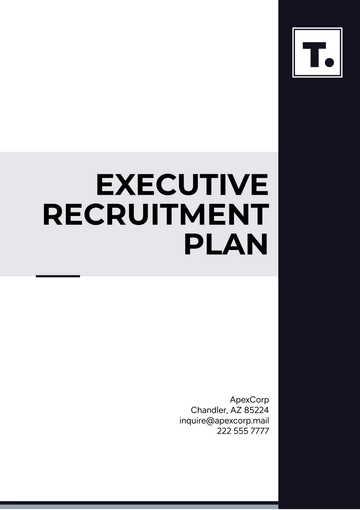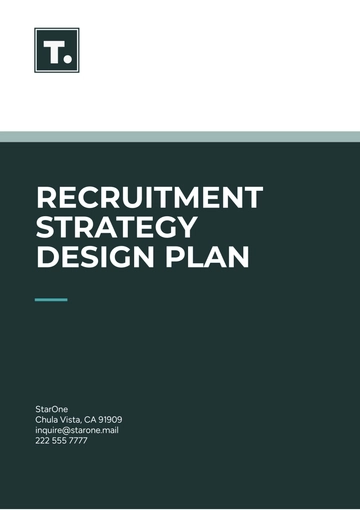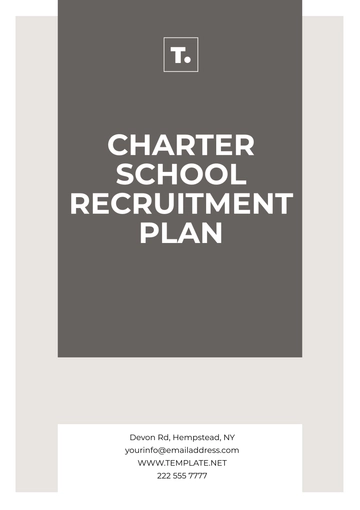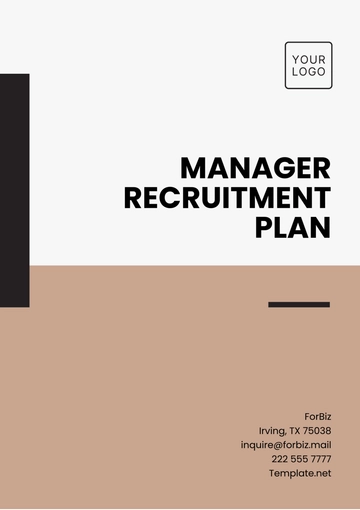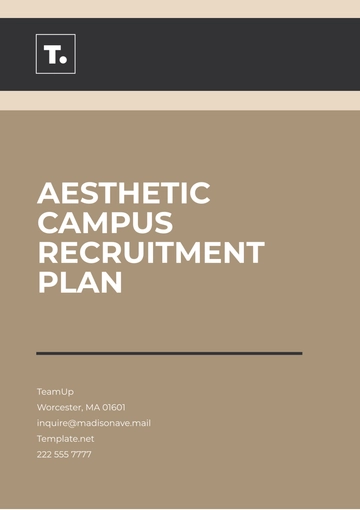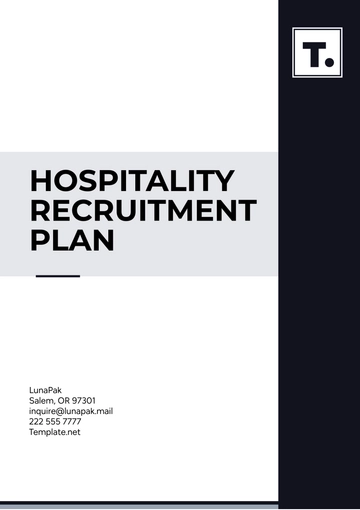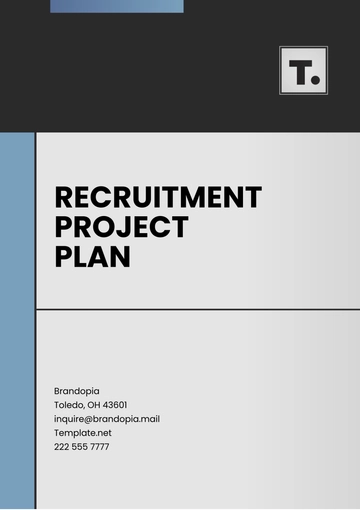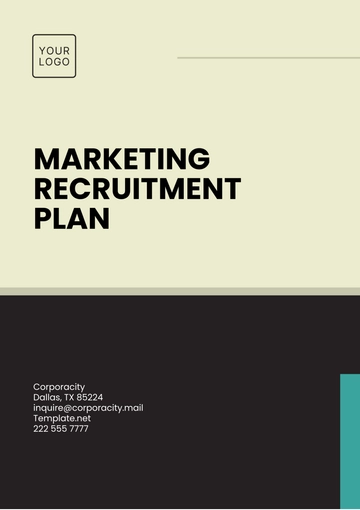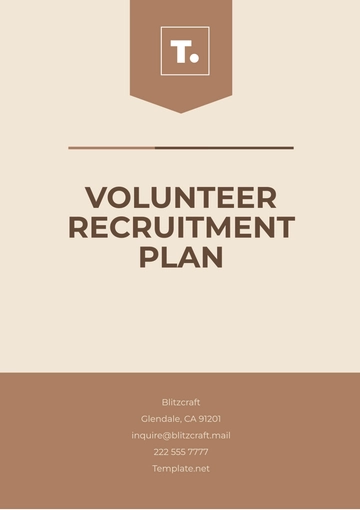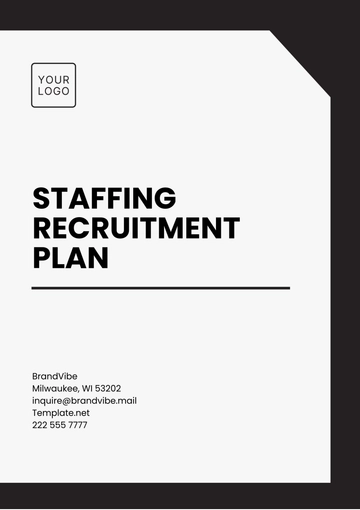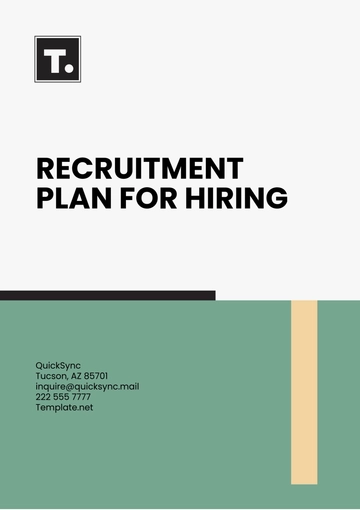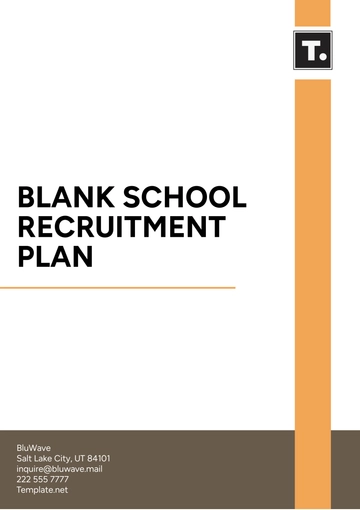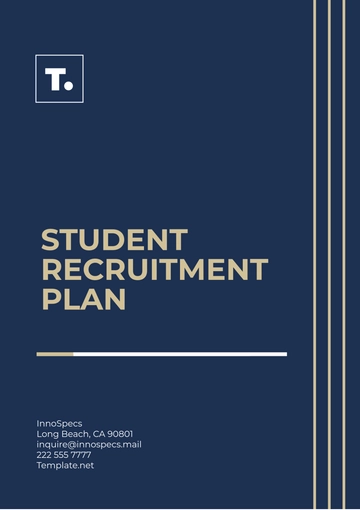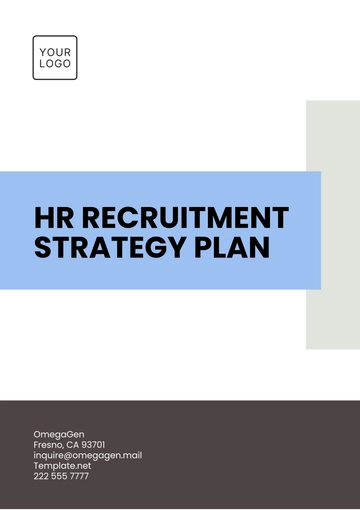Free Hospital Recruitment Plan
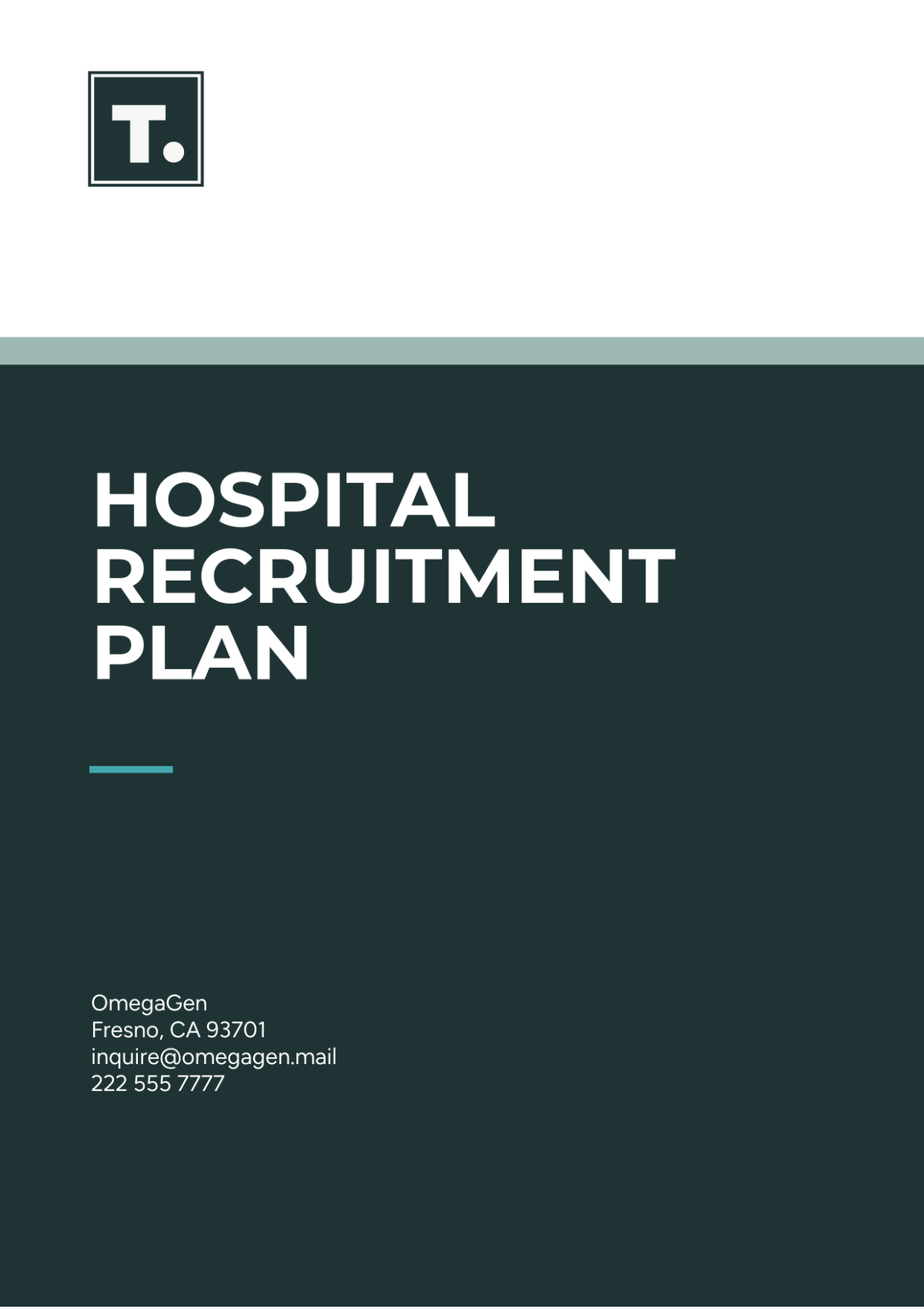
_____________________________________________________________________________________
Prepared by: [YOUR NAME]
Company: [YOUR COMPANY NAME]
Date: [DATE]
I. Executive Summary
The Hospital Recruitment Plan aims to address staffing shortages within the ICU. By attracting qualified nurses, the plan endeavors to ensure the delivery of high-quality patient care. Key strategies include targeted recruitment efforts and collaboration with nursing schools.
II. Staffing Needs Assessment
A. Current Staffing Levels
The ICU currently faces a shortage of qualified nurses, impacting patient care and staff workload.
B. Projected Vacancies
Anticipated vacancies due to retirements and resignations necessitate proactive recruitment efforts.
C. Patient Demand
Increased patient admissions and acuity levels underline the urgent need for additional nursing staff.
D. Strategic Priorities
Filling staffing gaps aligns the commitment to providing exceptional healthcare services.
III. Recruitment Strategies
A. Job Postings
Create compelling job postings highlighting the benefits of working in the ICU and [Your Company Name]'s commitment to employee growth.
B. Networking
Utilize professional networks, nursing associations, and alumni groups to reach potential candidates.
C. Partnerships
Forge partnerships with nursing schools to identify graduating students and offer internship opportunities.
D. Referrals
Encourage current staff to refer qualified candidates and offer referral bonuses as incentives.
E. Recruitment Events
Host recruitment events or open houses to showcase facilities and culture.
IV. Selection Process
Resume Screening | HR personnel will review resumes to shortlist candidates based on qualifications and experience. |
Interviewing | Conduct structured interviews with candidates to assess their clinical skills and teamwork abilities, and fit with the culture. |
Skills Assessment | Administer skills assessments or simulations to evaluate candidates' clinical competence. |
Reference Checks | Verify candidate credentials and conduct reference checks to ensure reliability and professionalism. |
Hiring Decision | Collaborate with department managers to make informed hiring decisions based on candidate performance and fit. |
V. Onboarding and Retention
A. Orientation Program
Develop a comprehensive orientation program to familiarize new hires with hospital policies, procedures, and patient care protocols.
B. Mentorship
Pair new nurses with experienced staff members to provide guidance and support during the transition period.
C. Training Opportunities
Offer ongoing training and professional development opportunities to enhance nurses' skills and promote career advancement.
D. Feedback Mechanism
Establish a feedback mechanism to solicit input from new hires and address any concerns or challenges they may encounter.
E. Retention Initiatives
Implement retention initiatives such as competitive compensation, benefits packages, and recognition programs to foster employee loyalty.
VI. Performance Monitoring and Evaluation
A. Key Performance Indicators
Define metrics such as time-to-fill, retention rates, and patient satisfaction scores to monitor the effectiveness of recruitment efforts.
B. Regular Review
Conduct regular reviews of recruitment outcomes to identify areas for improvement and refine strategies accordingly.
C. Stakeholder Feedback
Seek feedback from department managers, HR personnel, and new hires to assess the impact of recruitment initiatives on staffing levels and patient care.
- 100% Customizable, free editor
- Access 1 Million+ Templates, photo’s & graphics
- Download or share as a template
- Click and replace photos, graphics, text, backgrounds
- Resize, crop, AI write & more
- Access advanced editor
Introducing the Hospital Recruitment Plan Template by Template.net – the ultimate solution for staffing success! Crafted with precision, it's fully editable and customizable, tailored to streamline your hiring process effortlessly. With seamless integration into our Ai Editor Tool, refine your recruitment strategy with ease. Elevate your hospital's staffing game today with this indispensable resource.
You may also like
- Finance Plan
- Construction Plan
- Sales Plan
- Development Plan
- Career Plan
- Budget Plan
- HR Plan
- Education Plan
- Transition Plan
- Work Plan
- Training Plan
- Communication Plan
- Operation Plan
- Health And Safety Plan
- Strategy Plan
- Professional Development Plan
- Advertising Plan
- Risk Management Plan
- Restaurant Plan
- School Plan
- Nursing Home Patient Care Plan
- Nursing Care Plan
- Plan Event
- Startup Plan
- Social Media Plan
- Staffing Plan
- Annual Plan
- Content Plan
- Payment Plan
- Implementation Plan
- Hotel Plan
- Workout Plan
- Accounting Plan
- Campaign Plan
- Essay Plan
- 30 60 90 Day Plan
- Research Plan
- Recruitment Plan
- 90 Day Plan
- Quarterly Plan
- Emergency Plan
- 5 Year Plan
- Gym Plan
- Personal Plan
- IT and Software Plan
- Treatment Plan
- Real Estate Plan
- Law Firm Plan
- Healthcare Plan
- Improvement Plan
- Media Plan
- 5 Year Business Plan
- Learning Plan
- Marketing Campaign Plan
- Travel Agency Plan
- Cleaning Services Plan
- Interior Design Plan
- Performance Plan
- PR Plan
- Birth Plan
- Life Plan
- SEO Plan
- Disaster Recovery Plan
- Continuity Plan
- Launch Plan
- Legal Plan
- Behavior Plan
- Performance Improvement Plan
- Salon Plan
- Security Plan
- Security Management Plan
- Employee Development Plan
- Quality Plan
- Service Improvement Plan
- Growth Plan
- Incident Response Plan
- Basketball Plan
- Emergency Action Plan
- Product Launch Plan
- Spa Plan
- Employee Training Plan
- Data Analysis Plan
- Employee Action Plan
- Territory Plan
- Audit Plan
- Classroom Plan
- Activity Plan
- Parenting Plan
- Care Plan
- Project Execution Plan
- Exercise Plan
- Internship Plan
- Software Development Plan
- Continuous Improvement Plan
- Leave Plan
- 90 Day Sales Plan
- Advertising Agency Plan
- Employee Transition Plan
- Smart Action Plan
- Workplace Safety Plan
- Behavior Change Plan
- Contingency Plan
- Continuity of Operations Plan
- Health Plan
- Quality Control Plan
- Self Plan
- Sports Development Plan
- Change Management Plan
- Ecommerce Plan
- Personal Financial Plan
- Process Improvement Plan
- 30-60-90 Day Sales Plan
- Crisis Management Plan
- Engagement Plan
- Execution Plan
- Pandemic Plan
- Quality Assurance Plan
- Service Continuity Plan
- Agile Project Plan
- Fundraising Plan
- Job Transition Plan
- Asset Maintenance Plan
- Maintenance Plan
- Software Test Plan
- Staff Training and Development Plan
- 3 Year Plan
- Brand Activation Plan
- Release Plan
- Resource Plan
- Risk Mitigation Plan
- Teacher Plan
- 30 60 90 Day Plan for New Manager
- Food Safety Plan
- Food Truck Plan
- Hiring Plan
- Quality Management Plan
- Wellness Plan
- Behavior Intervention Plan
- Bonus Plan
- Investment Plan
- Maternity Leave Plan
- Pandemic Response Plan
- Succession Planning
- Coaching Plan
- Configuration Management Plan
- Remote Work Plan
- Self Care Plan
- Teaching Plan
- 100-Day Plan
- HACCP Plan
- Student Plan
- Sustainability Plan
- 30 60 90 Day Plan for Interview
- Access Plan
- Site Specific Safety Plan
